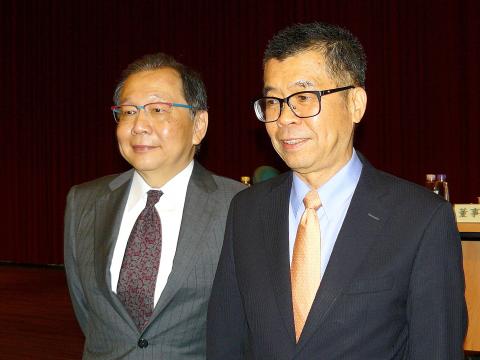Handset chip designer MediaTek Inc (聯發科) yesterday said it won back market share in China as its two-year “recovery plan,” which includes an improved product portfolio, yielded early results.
The plan was initiated in summer last year, after the Hsinchu-based firm hired chief executive Rick Tsai (蔡力行) to guide the company out of the woods.
A flawed product portfolio in 2016 dealt a blow to MediaTek’s market position and financial performance last year.

Photo: CNA
“Since the middle of last year, we have seen some recovery in terms of [demand for] customer ‘design-in’ and profits,” MediaTek chairman Tsai Ming-kai (蔡明介) told a news conference following an annual shareholders’ meeting, meaning that more phone vendors are using MediaTek’s chips.
“We think the first phase of our recovery plan will be achieved by the end of next year,” he said.
MediaTek has changed its product strategy to refocus on mid and low-range processors and ventured into Internet of Things chips, power management chips and application-specific ICs used in cryptocurrency mining machines.
The company said it has seen its market share bounce back to between 40 percent and 50 percent in China, compared with more than 30 percent in the prior year.
“We have turned the corner. We have seen an upturn in momentum over the past year,” Rick Tsai told reporters. “You might also notice that we regained [orders] from an [old] customer, which recently unveiled a new product powered by our Helio P22 [processor].”
Chinese smartphone vendor Xiaomi Corp (小米) could be the company Tsai implied.
Xiaomi on Wednesday unveiled a new entry-level model dubbed Red Rice 6 that is equipped with MediaTek’s Helio P22 processors, and it uses the company’s Helio A22 processors for the low-cost version of the phone.
In April, MediaTek beat rival Qualcomm to supply Helio P60 chips to Oppo Mobile Telecommunications Corp (歐珀移動) for its mid-range R15 smartphone.
Vivo Communication Technology Co (維沃) has also picked Helio 60 and Helio 22 processors to adapt its phones for artificial intelligence (AI) applications, such as facial recognition and voice assistance.
MediaTek plans to unveil two to three new processors in the second half of this year to coincide with the handset industry’s peak season, taking on Qualcomm’s new processors, such as the Snapdragon 710.
The company is also accelerating investment in key technologies including AI and 5G.
“Our previously planned NT$200 billion [US$6.67 billion] five-year research and development budget is definitely not enough. We will increase the budget,” Tsai Ming-kai said, without giving a specific figure.
The company, which employs about 10,000 people, has research and development teams in Taiwan, the US, India and China, it said.
Shareholders yesterday approved the distribution of a cash dividend of NT$7.5 per common share, representing a payout ratio of 48.2 percent based on last year’s earnings per share of NT$15.56.

GROWING OWINGS: While Luxembourg and China swapped the top three spots, the US continued to be the largest exposure for Taiwan for the 41st consecutive quarter The US remained the largest debtor nation to Taiwan’s banking sector for the 41st consecutive quarter at the end of September, after local banks’ exposure to the US market rose more than 2 percent from three months earlier, the central bank said. Exposure to the US increased to US$198.896 billion, up US$4.026 billion, or 2.07 percent, from US$194.87 billion in the previous quarter, data released by the central bank showed on Friday. Of the increase, about US$1.4 billion came from banks’ investments in securitized products and interbank loans in the US, while another US$2.6 billion stemmed from trust assets, including mutual funds,

Micron Memory Taiwan Co (台灣美光), a subsidiary of US memorychip maker Micron Technology Inc, has been granted a NT$4.7 billion (US$149.5 million) subsidy under the Ministry of Economic Affairs A+ Corporate Innovation and R&D Enhancement program, the ministry said yesterday. The US memorychip maker’s program aims to back the development of high-performance and high-bandwidth memory chips with a total budget of NT$11.75 billion, the ministry said. Aside from the government funding, Micron is to inject the remaining investment of NT$7.06 billion as the company applied to participate the government’s Global Innovation Partnership Program to deepen technology cooperation, a ministry official told the

AI TALENT: No financial details were released about the deal, in which top Groq executives, including its CEO, would join Nvidia to help advance the technology Nvidia Corp has agreed to a licensing deal with artificial intelligence (AI) start-up Groq, furthering its investments in companies connected to the AI boom and gaining the right to add a new type of technology to its products. The world’s largest publicly traded company has paid for the right to use Groq’s technology and is to integrate its chip design into future products. Some of the start-up’s executives are leaving to join Nvidia to help with that effort, the companies said. Groq would continue as an independent company with a new chief executive, it said on Wednesday in a post on its Web

Taiwan Semiconductor Manufacturing Co (TSMC, 台積電), the world’s leading advanced chipmaker, officially began volume production of its 2-nanometer chips in the fourth quarter of this year, according to a recent update on the company’s Web site. The low-key announcement confirms that TSMC, the go-to chipmaker for artificial intelligence (AI) hardware providers Nvidia Corp and iPhone maker Apple Inc, met its original roadmap for the next-generation technology. Production is currently centered at Fab 22 in Kaohsiung, utilizing the company’s first-generation nanosheet transistor technology. The new architecture achieves “full-node strides in performance and power consumption,” TSMC said. The company described the 2nm process as